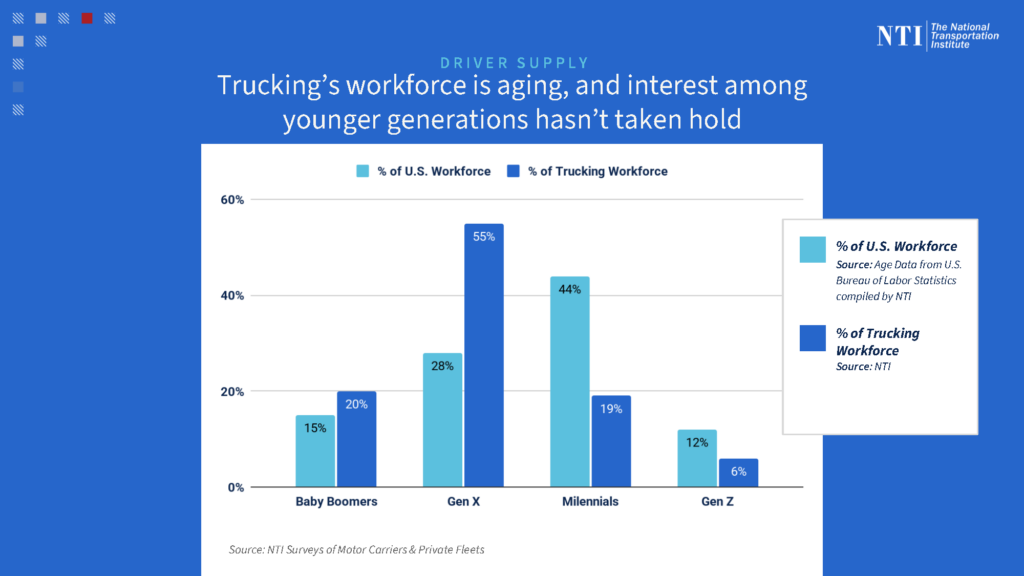Our son Malachi is three years old, and he already knows every type of truck and what they do. He knows them by name, by site, and by function. You can point to a picture, and he can tell you all about it. He cheers when we happen upon a truck — any type: a semi, a firetruck, a garbage truck, you name it.
And when he actually gets to engage with the operator of that truck, his whole day is made.
Let’s put a pin in that for just a sec. I’m about to tie a few themes together.
At the end of August, I hosted a week of programming on SiriusXM’s Road Dog Trucking Radio and spent five days straight talking to drivers for three hours a day about, well, a long list of topics big, small, important, mundane, and everything in between.
Also that week, Hannah Dannecker, who’s doing some very cool work writing children’s books about all of the various roles in trucking, joined me for an hour as a guest on air. She quoted a Harvard study that said 30% of children follow in their parents’ footsteps professionally. I would venture to say when I entered trucking 25 years ago that that percentage was even higher in our industry.

Based on my conversations in late August with drivers, it seems like that’s no longer the case. Many said they discourage kids, especially their own, from entering trucking, for reasons we’ll expand on it in just a moment.
As we know, the average age of a new entrant driver in our industry is well into their 30s and they’ve already tried several other careers first.
In our work with the Next Generation in Trucking, whose mission is to engage young people to bring awareness to and promote interest in careers in trucking, we see even though there might be some excitement there around trucking, there’s still a big gap between my knowledgeable excited toddler and the teen years when people start the journey of choosing a career.
Where does this breakdown happen? Where does the disconnect occur between a child’s excitement of trucks and truckers, teens who have become somewhat apathetic to trucking, and our professional drivers who say they discourage their kids from entering trucking in any way?
Some of the most vulnerable conversations a few weeks ago were with older men, primarily, and a few women, too, who recounted the sacrifices they made in terms of time with their kids during crucial periods.
As a mom of a 3-year-old, I can’t even imagine having to explain that choice to myself or my family. I can’t imagine what it felt like for all of these drivers in their careers in the times that their kids were growing up and understanding dad’s not going to be home all the time.
Trucking can often be a lucrative career, but that opportunity comes with the inherent sacrifice we all know about — sometimes stinging absences from family life that resonate internally with our drivers even after their child-rearing days are over.
My point here isn’t to be negative about the driving job. Far from it. You know that I shout loudly and often how amazing trucking careers are, because I believe it to my core. But our empathy for those sacrifices that drivers shared with me in such a raw way hits home. When they don’t feel that empathy or that understanding, they are discouraged. They then discourage others from joining our industry.
Drivers tell us what appreciation looks like, and they also tell us what they feel is missing from appreciation, if we’re listening
The drivers who reported being the most satisfied when I spoke with them in August, even if they had an over-the-road job, were in a role that took them out and back within a few days. A job that allowed at least a day or two at home in between routes to do laundry, maintain their truck, connect with loved ones, take care of tasks at home, make doctor’s appointments. Their jobs allowed them more frequent connections at home and, no surprise, made for a happier person and a more fulfilled driver.
However, we know the data shows those openings today are fewer and farther between, while openings for jobs that are less desirable, require more significant time away, and more significant sacrifice, are much more widespread.
Drivers told me what would have made them more encouraging for the next generation would have been more opportunities at younger ages and earlier in their career to have jobs that allowed them to build and make connections with important people at home, that allowed them to take better pride in their equipment and their company by coming in more often, and to maintain their health.
In the context of talking about the next generation of drivers, I also heard from older drivers that, if you’re going to do the job of a professional truck driver, you have to be OK with solitude. That it’s better to do the job when you’re single and then switch careers when you do want a family. When looking back on their careers, they said trucking allowed them to financially support their family, but emotionally it did not allow them to maintain the meaningful connections they craved in the way they would have hoped. They looked back with regret.
Tying that into our research at NTI: We know that early tenured drivers have the types of roles that are less desirable and keep them gone from their lives and from home
There’s also significantly more churn in those jobs. What’s missing is work-life balance. And thus, younger generations aren’t coming into trucking jobs. NTI data starkly shows that fewer people in their 20s and 30s work in trucking jobs than in 2019 and far fewer than in 1995, while the share of drivers in their 40s, 50s, 60s, 70s(!) is increasing.
The strong paychecks that come with trucking jobs when compared to competing industries is what draws people to us. Pay is the handshake deal that gets them in the door of our industry and our companies. But the paycheck only goes so far. It isn’t the paycheck that drivers point to often when they talk about their satisfaction with their jobs or lack thereof.
They need the money. But they want the empathy. They want us to understand that they make real, lifelong sacrifices of what’s most important to them to work in this industry, for your company, and for our society.
In my mind, that’s where the true meaning of appreciation lies. That we all collectively focus and consistently say thanks for all you do. We understand. We see it. We appreciate it.
While we encourage a myriad of other ways to take steps to mitigate some of the topics outlined here, those phrases expressing authentic empathy, gratitude, and understanding can go a very long way to making drivers feel seen, fulfilled, satisfied, and more likely to encourage younger people to enter the industry with some level of enthusiasm.
Until next time, stay safe and well. ~Leah


